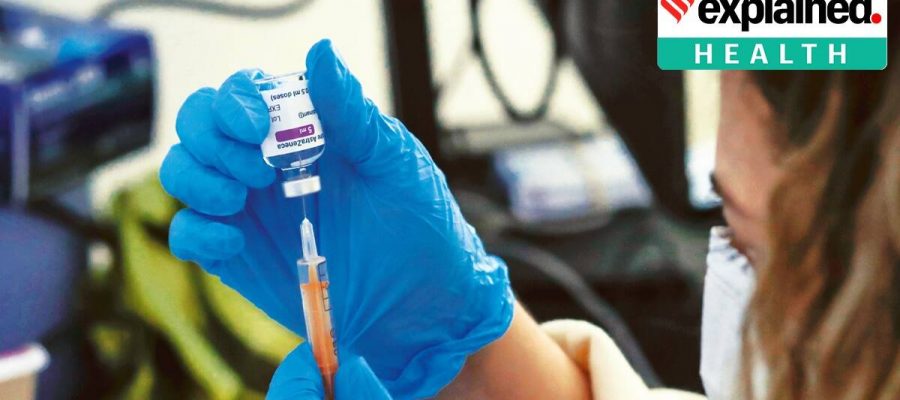Even with several vaccines already on the market, the researchers say this candidate may have advantages worth exploring – especially related to the measles vaccine’s established safety, durability and high-efficacy profile.
Researchers have developed a new SARS-CoV-2 vaccine candidate using a measles vaccine. The gene of a key protein is encased in a measles vaccine and delivered into the body. In a new paper in the journal PNAS, researchers from Ohio State University have reported the results of multiple animal studies —the vaccine produces a strong immune response and prevents SARS-CoV-2 infection and lung disease.
Newsletter | Click to get the day’s best explainers in your inbox
The University describes the vaccine as using a specific snippet of the coronavirus spike protein gene, and inserting it into a sweet spot in the measles vaccine genome to boost activation, or expression, of the gene that makes the protein.
Even with several vaccines already on the market, the researchers say this candidate may have advantages worth exploring – especially related to the measles vaccine’s established safety, durability and high-efficacy profile.
“The measles vaccine has been used in children since the 1960s, and has a long history of safety for children and adults. We also know the measles vaccine can produce long-term protection. The hope is that with the antigen inside, it can produce long-term protection against SARS-CoV-2. That would be a big advantage, because right now we don’t know how long protection will last with any vaccine platforms,” Professor Jianrong Li, senior author of the study, said in a media release issued by Ohio State University.
Like all vaccines, this candidate initiates the production of antibodies that recognise the new protein as foreign, training the immune system to attack and neutralise the spike protein if SARS-CoV-2 ever enters the body.
The research team tested seven versions of the spike protein to find the most effective antigen. They landed on a stabilised “prefusion” version of the protein — the shape the protein is in before it infects a cell. The scientists inserted the prefusion spike protein gene containing manufacturing instructions into a segment of the measles vaccine genome to generate high expression of the protein, reasoning that the more SARS-CoV-2 spike protein produced, the better the immune response.
The team tested the vaccine candidate in several animal models to gauge its effectiveness. They found that the vaccine induced high levels of neutralizing antibodies against SARS-CoV-2 in all of the animals, the release said.
Also, genetically modified mice produced helper T cells in response to the vaccine. “The orientation of T helper cells induced by a vaccine is an important predictor of protection, and this vaccine mainly induces Th1 cells, which enhances the safety and efficacy of the vaccine,” co-author Amit Kapoor was quoted as saying.
Golden Syrian hamsters received the vaccine and were then injected with the coronavirus. The vaccinated hamsters were protected from lung infection and other sickness symptoms indicated through weight loss, the release said.
Source: Ohio State University
Source: Read Full Article


